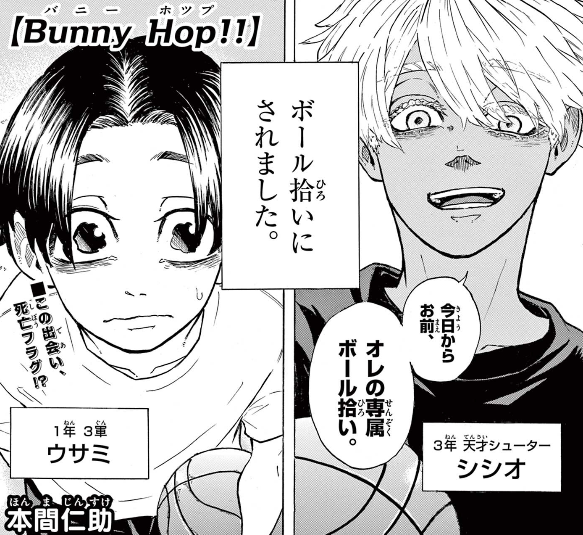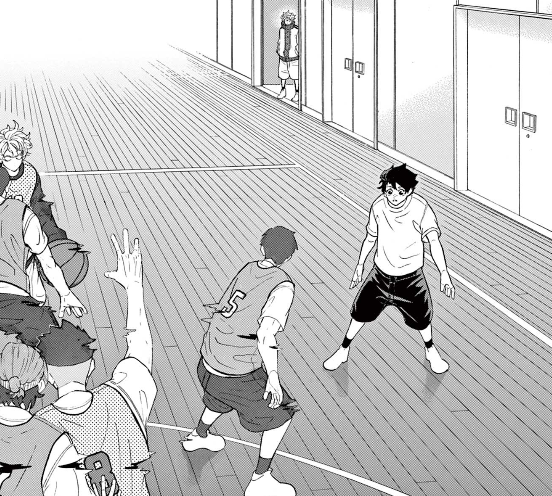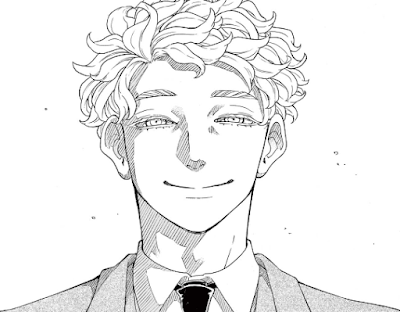Here's the second of four fall Shonen Sunday new serializations! Jinsuke Honma-sensei's pureblood WSS through and through, and has a ton of short stories with one theme uniting theme. We'll go through the straight path that lead to Ichika Bachika down below.
The Author
Jinsuke Honda
Jinsuke Honma hails from Tokyo, and as far as I can see, their first foray into the manga world was an entry for the 89th Shogakukan rookie award, which they entered at 22 years old. They didn't win, but were selected as one of the finalists for their manga Monster Punch.
Frontispiece for Monster Punch
In Monster Punch, Tatara is a boy who is well liked for his gentle nature, but within he's the type who'd cheer for the monsters to win in TV shows, and feels an urge for violence. He barely masks this urge to be a monster in his interactions with his classmates and friends, but feels like he's only one bad day away from becoming that which lurks in the night. What's a guy to do?
By happenstance, he encounters a man who can see right through his facade and drags him away to...a boxing gym?? It's there he fights against the gym ace who at first doesn't think much of him, but then immediately realizes with his swift movements and superhuman instinct that this is no mere man he's up against, but a monster. He utters this out loud, and Tatara smiles, thanking his opponent for recognizing what he really is.
The oneshot feels like a portmanteau between two other current Shonen Sunday manga -- Atsushi Namikiri's RedBlue and Mitsuharu Yanamoto's Ryuu to Ichigo. With artwork from Ken Wakui of Tokyo Revengers fame. It's an odd mixture of things, but I think the tempo and even the ending, as inconclusive as it is feels just right. Not interested in what I have to say about the work? Fair enough, how about what Rumiko Takahashi, Mitsuru Adachi, Gosho Aoyama and Kenjiro Hata's thoughts? That's right, I also found the judges for this contest and their commentary! Let's take a look at a snippet of each judge's feelings.
Adachi (like me) says that it's well paced and easy to read -- that none of the 32 pages are wasted. Rumiko Takahashi comments that the characters are easy to understand, and she enjoyed reading. Tatara's face is scary to her, but she thinks that goes well with the second half of the oneshot, and comments that a more positive protagonist could have been just as good. Aoyama on the other hand was a bit more critical, saying that lying to oneself doesn't correlate to boxing, and that there should have been more of Tatara's everyday life to be more convincing. He does praise the art, and wants to see where Honma will go next. Interestingly enough, Hata says the art is too influenced by existing artists and the inclusion of boxing is a reach, especially since Tatara has no experience with the sport but immediately takes to it. He did like how it started, but felt the ending lacks the cohesion the start did. I'm not surprised Hata had the most to say as he's a self admitted manga freak, but it's all fair critique. Honma-sensei goes on the short 8-page manga circuit for a while after this, so let's take a look at those next.
From left to right, top to bottom: Bunny Hop, Izuru no Ongaeshi, Haiboku Gourmet, Inverse Striker, Pride Battery, and Wakiyaku Spotlight
Shogakukan has a Sunday Battle 8 contest that challenges authors to tell an entire story in 8 pages utilizing a specific theme. Many of the authors mentioned in these reviews have participated in this contest, and Jinsuke Honma-sensei is no exception. From the above six oneshots, all but two of them — Izuru no Ongaeshi and Pride Battery are 8 pages. The entirety of Honma-sensei's works are sports related as well, so that appears to be their comfort zone.
Bunny Hop and Haiboku Gourmet
I'll keep the shorts together and cover the longer works afterward. Bunny Hop and Haiboku Gourmet (or Gourmet of Defeat) both use sports as a character study. The first follows a boy who sucks at Basketball despite his dream of being on the court, and it's a senpai he thought wasn't watching him to take notice of his potential and want to draw it out that keeps him sprinting toward his dreams. Then on the subject of sprinting, Haiboku Gourmet features two friends on the track team enjoying the spoils after practice (in this case meatpies) and how their tastes off field are different, but their synergy on the track is perfect. In this case, it is the destination --the convenience store that matters more than the trip! It'd be remiss of me to not mention that the latter's theme was “gourmet” so Honma-sensei succeeded somehow in making this about sports. Kind of impressive if you think about it.
From Inverse Striker
Wakiyaku Spotlight
The second set, Inverse Striker and Wakiyaku Spotlight (or Supporting Role Spotlight) are more focused on their respective sports (Basketball and Soccer) but the latter features a bit of a character arc. Inverse Striker is pure adrenaline and speed as the lead Kensuke Koshiro looks like an unassuming guy at first glance but easily blows through an entire team to show he's no joke. Meanwhile in the second oneshot, the lead is a bench warmer who feels like his role in the team is to lead their ace to victory, but said ace recognizes him after making the score that wins the game with a bow afterward. Personally, I like the message in the second one more than the first, but the Blue Lock esque exploits are hype. More importantly, Honma-sensei has taken the criticisms of the judges to heart, as their art starts to take on a shape of its own, and these short stories are honing in their ability to tell concise, and cohesive stories.
Izuru no Ongaeshi
Izuru no Ongaeshi (or Izuru's repayment) steps off the court and is a Judo story about the titular Izuru who loves watching his brother practice Judo. He thinks of himself as being less talented, but his brother keeps pushing him not realizing his conflicting, complex feelings of admiration and self-loathing which leads to them having a fight. Not long after his brother falls ill, and Izuru realizes it's because of his admiration his brother was able to reach great heights, and it's that inspiration that moves him to break out of his self-loathing and deliver the most awesome looking pages (above.) This one shot definitely takes the criticism the judges offered to give a very well paced and emotionally rewarding story in where Izuru thanks his brother not just with words but with actions.
Pride Battery
Aside from sports, Honma's go to is connections. In most of these stories a character has either resigned themselves to mediocrity or given up a sport entirely due to their lack of ability, but it's good ol' friendship, effort, and victory that leads them to rethink giving up. Pride Battery lives up to this proud Honma tradition in a story about two baseball players, one who's heading to Koshien and the other who's good but not great. When the former inexplicably gives up a chance to go to the Koshien on his own, he reveals that he wouldn't even be o n the field had it not been for his friend --he's playing baseball for him, not necessarily for victory. It's a touching story punctuated with Honma's ever improving art, but I can't help but think a better friend would have told his friend to pursue their dream without him, but I don't want to be that guy --plus the story is effective in conveying the point it means to, so this is fine.
Honma's had a lot of time and the blessing of Sunday veterans leading up to---
The Serial
Ichika Bachika
Starting in issue #40 of Weekly Shonen Sunday is Jinsuke Honma's first long term serial, Ichika Bachika. The phrase “Ichika Bachika” can mean several things, ranging from “Sink or swim” or “all or nothing.” The series original blurb states that it's a story about a Basketball dropout and a gifted but aloof boy revolutionizing the game of Basketball.
The Premise
Hachi is the son of the god-tier Basketball coach, Jinichi Shiragami. People talk about the “son of God who vanished” in hushed whispers, all without realizing that's him. His Dad had high hopes for him, but he doesn't have any talent in the sport so he's all but abandoned him. Though Hachi has no talent on the court, he does have a weird ability in that he can “see” people's enmity.
No, literally it's written on their faces to him, like seen above. So while Jinsuke never actually said he hates his son for being talentless, Hachi has had a constant visual reminder.
On the other end there's Hajime Aguro who's a god-tier player, something Jinsuke can tell immediately. Except he has little to no interest in the sport and hides away from his coach's terrifying eyes just so he doesn't have to play. Little does he know that he and Hachi's paths are about to intersect...
Hachi is able to use his “ability” to sense enmity to then weave and dodge through his enemies, as he can tell what their next moves are going to be. Though he's too meek to actually play against real opponents, he's able to visual their movements and play mock games on his own. Though this obviously isn't as fulfilling as being on the court himself, and deep down, despite knowing that his father only thinks of him as a blight on the family name, he still wants to play. When Hajime bears witness to one of these mock games, he realizes Hachi's potential and intends to drag him onto the court whether he likes it or not, since he believes it'll make an otherwise boring game interesting.
The subsequent chapters are an extension of Honma-sensei's previous oneshots in that the sport is a framing device for Hachi to realize his trauma due to his father neglecting him. He's not afraid of being on the court because of Basketball, or even his father, no, it's the idea placed within him that being on the court means that the team he's associated with will lose by default.
The text reads "Its your fault."
Hajime (or Ichi, hence the Ichika Bachika, since Hachi can be read as Bachi too) steps in and takes responsibility for Hachi on the court which has a double effect: it shows his complete faith in Hachi's potential, and relieves the stress of his existence meaning his team will fail. Freed from these shackles, Hachi can fully engross himself in the sport and...
Not only is he good at it, but it's....fun. This is the game he dreamt about, but now it's reality, and all it took is one person believing in him. Honma has had a lot of time to perfect everything about their storytelling and artwork, and Ichika Bachika is better for it. There are some things that only a serialization can do, and this is a perfect showing of why that is. Chapter one is set up, and two is payoff. Though Jinsuke isn't about to make this easy which gets me wondering why he's so against his son succeeding? He's ready to shelve an entire team just so his son can't play, and it takes Ichi threatening to abdicate his position as ace to keep that from happening.
Ichi goading Hachi on finally leads the boy to stand up for himself (kind of as he asks his father permission to crush the team he's so proud of with his own skills) and he just...smiles. Is he proud of his son coming out of his shell? Or is that a "I'm going to have so much fun destroying you" smile? Jinsuke's an enigma wrapped in a mystery. Truly, I'm almost more interested in him than his son and the genius who is Ichi.
The most recent (as of this writing) chapter also denotes that this is going to be a less realistic take on the sport, as other players have innate "abilities" similar to Hachi's, such as a "scope vision" that allows for high speed calculations. It's one of those things where it's an informed talent that a normal person could have, but clocked up to eleven. Personally, I like it more when a sport series plays things up rather than being a completely realistic take on the sport, so this is right up my alley. Also of note is Honma's art has become much more stylized with this work, leading to some funky looking proportions and an art style that has changed from Ken Wakui to Kei Gachi Akuta Urana's (the latter I like more so excuse my bias) while still remaining it's own very unique flavor.
Interestingly, Ichi's ability hasn't been revealed so far. Does he even have one? Or is he just that good? In fact these chapters reveal very little about him overall so I wonder what Honma-sensei is cooking?
The Verdict
Ichika Bachika represents a path of refining one's efforts. Like the characters depicted in their works, Jinsuke Honma has remained on their chosen court or field refining themselves until they stand shoulder to shoulder with the very same senpai who rated their first entry. At the same time, it's pastiche of tried and true shonen sensibilities with a slight (for now) battle manga bent hasn't been seen in the pages of Sunday for some time. I feel this is a strength in a magazine where the sports series are played to their logical, and more realistic ends to create en experience that's one of a kind. Whether it'll survive in the magazine long term will depend on whether Honma-sensei is willing to bet all or nothing.
































Comments
Post a Comment